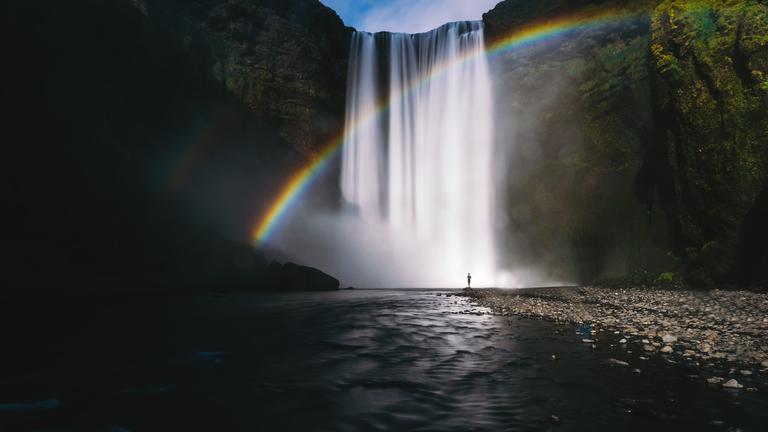CIIS’ new M.A. in Expressive Arts Coaching & Community Building is the first degree of its kind in the U.S.

The Ecology, Spirituality, and Religion Annual Summit Returns
The 7th Annual Religion and Ecology Summit will celebrate the sacred waters of the world.
The Department of Ecology, Spirituality, and Religion will host its 7th Annual Religion and Ecology Summit April 21-23 in 2025. Each year, the Summit convenes a vibrant community of academics, activists, and religious leaders to deepen conversations on the intersection of religions and spiritualities and the built and natural environments.
The diverse audience includes faculty and students from environmental studies, religion, philosophy, and related disciplines, as well as leaders and activists from environmental justice movements and faith communities.
From the first summit in 2016, the event has been an opportunity to nurture regional and — now that it is held primarily online rather than in person — international conversations about the relationships between religions, spiritualities, philosophies, and socio-ecological issues.
For Program Coordinator Charlie Forbes, the Summit highlights how Ecology, Spirituality, and Religion’s interdisciplinary focus on ecology places the department at “the heart of CIIS' global mission to foster progressive and transformative scholarship related to environmental sustainability and advocacy.”
In addition to being a powerful gathering of scholars, activists, and spiritual leaders, the Summit is also a significant opportunity for graduate students to showcase their scholarship, create connections with others in the field, and develop pathways to public-sector careers in religion and ecology.
The theme of this year’s Summit, Sacred Waters of the World: Pathways to Ecological Reverence, Renewal, and Responsibility, pays homage to Dr. John Grim and Dr. Mary Evelyn Tucker’s methodological framework of retrieval, reevaluation, and reconstruction from their book Ecology and Religion. Participants were invited to focus on water as a sustaining and shaping force in ecosystems, cultures, and spiritual practices as well as on rising global water crises: pollution, scarcity, and climate-driven sea rise and drought. The themes of reverence, renewal, and responsibility underscore the necessity of water to life, as well as its central role in ritual, myth, and cultural identity, in order to “foster a sustainable and sacred relationship with the Earth.”
Our interdisciplinary focus on ecology places us at the heart of CIIS's global mission to foster progressive and transformative scholarship related to environmental sustainability and advocacy.
Charlie Forbes, M.A. '19, Program Coordinator, Ecology, Spirituality, and Religion
Two days of online panels and talks will cover a wide variety of interrelated topics, including “The Power of Water in Religious Networks and Creation,” “Water Spirituality and Ethics for Environmental Change,” and “Rivers and the Rights of Nature.”
Day two will include a keynote from Swati Thiyagarajan, an award-winning international conservation and wildlife journalist who is a storyteller for the Sea Change Project, a Cape Town–based nonprofit dedicated to the long-term protection of the Great African Seaforest. She was also the associate producer of the Academy Award–winning film My Octopus Teacher (2020) and serves on the advisory board of the Senckenberg Ocean Species Alliance, which works to protect marine species biodiversity.
The Sea Change Project connects humanity and the natural world through storytelling, advocacy, and community engagement that exemplifies Ecology, Spirituality, and Religion’s mission to bridge ecological awareness and reverence for the more-than-human world. “We hope [Thiyagarajan’s] voice will not only inspire, but also provide a framework for the conversations, questions, and inner reflections we intend to cultivate throughout the event,” said Forbes.
The Summit concludes on day three with an optional in-person event for those in the Bay Area. Joshua Halpern, M.A. ‘13, Philosophy, Cosmology, and Consciousness, will lead a Watershed Witness Tour focusing on the hidden histories and topographies of San Francisco's overlooked waterways.
Since his studies at CIIS, Halpern has developed a unique guiding practice that offers ecological explorations of interwoven urban and natural ecosystems. The watershed tour will provide participants with an opportunity to engage with the local environment through an ecological and spiritual lens and put the Summit’s themes into practice.

Ecology, Spirituality, and Religion
A visionary graduate department exploring the intersections of nature, culture, and spirit
Related News
Transformative Leadership alum Cynthia Huie, M.A. '24, brings creativity and connection to the San Francisco small-business community.
A panel hosted by the Department of Human Sexuality gathered notable alumni from the Ph.D. program to discuss their change-making work and research.



